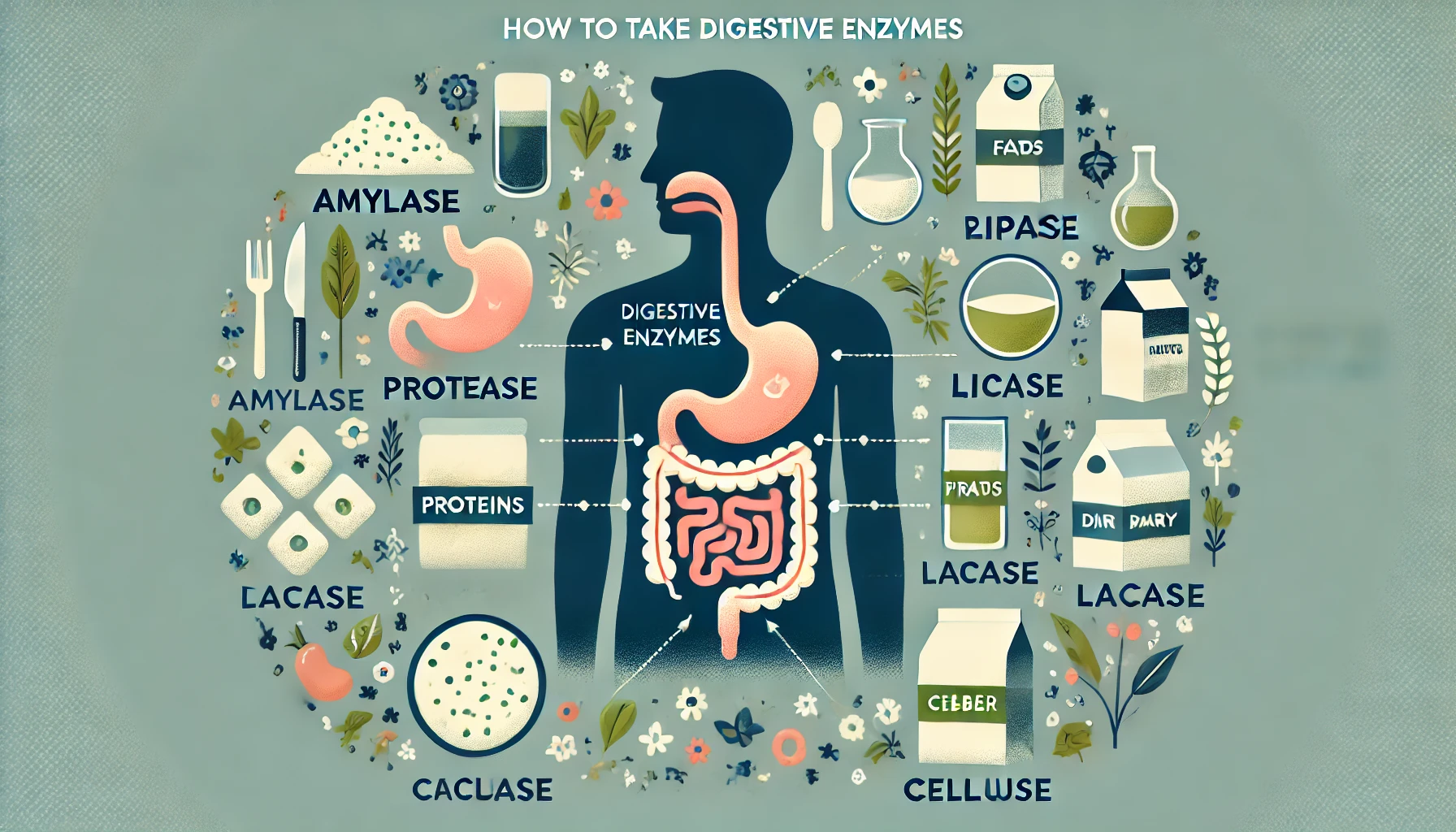Digestive enzymes are crucial for breaking down the food we eat into nutrients that our bodies can absorb. While they offer numerous benefits, such as improving digestion and alleviating bloating, there are potential side effects to be aware of. In this article, we’ll explore the common and less common side effects of digestive enzymes, as well as how to mitigate them.

Common Side Effects of Digestive Enzymes
Digestive enzymes can sometimes cause mild side effects, especially when taken in excess or if they are not suited to an individual’s digestive needs (1).
Gastrointestinal Discomfort
One of the most common side effects is gastrointestinal discomfort, including symptoms like bloating, gas, and cramping. These symptoms often occur because the body is adjusting to the introduction of additional enzymes.
Summary: Gastrointestinal discomfort such as bloating and gas may occur when the body adjusts to extra digestive enzymes.
Diarrhea
Taking digestive enzymes can also lead to diarrhea. This is particularly likely if the enzymes are taken in large doses or if the individual has a sensitivity to one of the components in the enzyme supplement.
Summary: Diarrhea can occur if digestive enzymes are taken in high doses or if the user is sensitive to any of the ingredients.
Less Common Side Effects
While rare, there are other side effects that users should be aware of.
Allergic Reactions
Some people may experience allergic reactions to certain ingredients in digestive enzyme supplements. These reactions can range from mild symptoms, such as rashes and itching, to more severe reactions like difficulty breathing and swelling.
Summary: Allergic reactions to ingredients in digestive enzyme supplements can cause symptoms ranging from mild rashes to severe breathing difficulties.
Mouth Irritation
Certain types of digestive enzymes, particularly those derived from natural sources like papain (from papayas) and bromelain (from pineapples), may cause mouth irritation or sores when taken in tablet or capsule form.
Summary: Enzymes like papain and bromelain might cause mouth irritation or sores when ingested in tablet or capsule form.
Long-Term Side Effects and Considerations
Long-term use of digestive enzymes, especially without medical supervision, can lead to some potential issues.
Dependency
Over-reliance on digestive enzymes may result in the body’s natural enzyme production diminishing over time. This dependency can cause digestive problems when not using supplements.
Summary: Long-term use of digestive enzymes without guidance may lead to dependency and reduced natural enzyme production.
Interference with Medications
Digestive enzymes can sometimes interfere with the absorption and effectiveness of certain medications, such as antacids and medications used for managing diabetes. It is important to consult a healthcare professional before combining these supplements with other medications.
Summary: Digestive enzymes may interfere with medications, making it crucial to consult with a healthcare professional before use.
Who Should Avoid Digestive Enzymes?
While digestive enzymes are generally safe, some individuals should avoid them.
People with Specific Health Conditions
Individuals with conditions like ulcers, gallstones, or chronic pancreatitis should consult their healthcare provider before taking digestive enzymes, as they may exacerbate these conditions.
Summary: People with certain health conditions like ulcers and pancreatitis should avoid digestive enzymes unless advised by a doctor.
Pregnant or Nursing Women
There is limited research on the effects of digestive enzymes on pregnant or nursing women, so it is advisable to err on the side of caution and consult a healthcare professional.
Summary: Pregnant or nursing women should consult their doctor before taking digestive enzyme supplements due to limited research on safety.
FAQs
Can I take digestive enzymes daily?
Yes, digestive enzymes can generally be taken daily, but it is important to follow dosage recommendations and consult a healthcare provider to avoid potential side effects or interactions with medications.
Are there natural sources of digestive enzymes?
Yes, natural sources of digestive enzymes include fruits like papaya and pineapple, as well as fermented foods such as yogurt and kimchi.
Can digestive enzymes help with acid reflux?
Digestive enzymes may help with acid reflux in some cases, but they can also worsen symptoms in others. It’s best to consult with a healthcare professional to determine if they are suitable for your condition.
What should I do if I experience side effects from digestive enzymes?
If you experience mild side effects, you might try adjusting the dosage or switching to a different type of enzyme. For severe reactions, discontinue use immediately and consult a healthcare professional.
The Final Note
While digestive enzymes can offer significant benefits for digestive health, they are not without potential side effects. It’s important to be aware of these side effects and consult with a healthcare professional before starting any new supplement regimen, particularly if you have underlying health conditions or are taking other medications. For those looking to explore their options, consider checking out the best Digestive Enzyme Supplements available to find a suitable choice for your needs.





